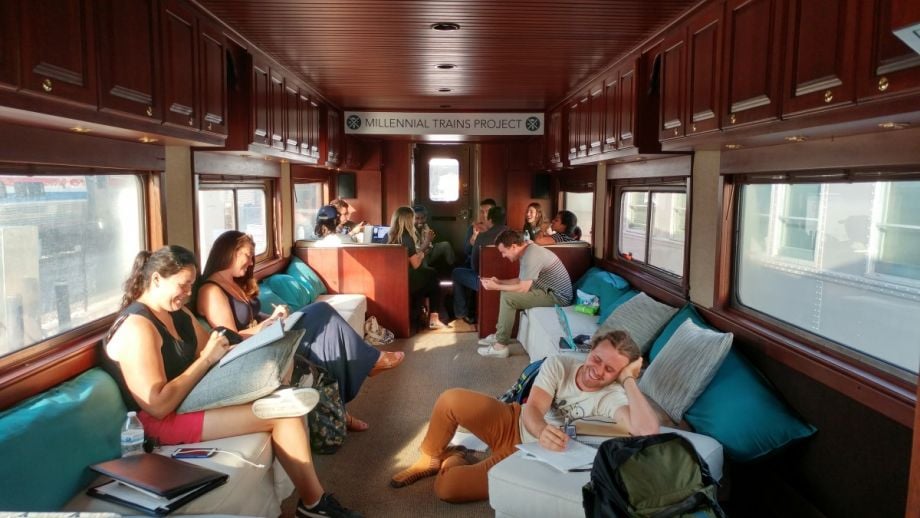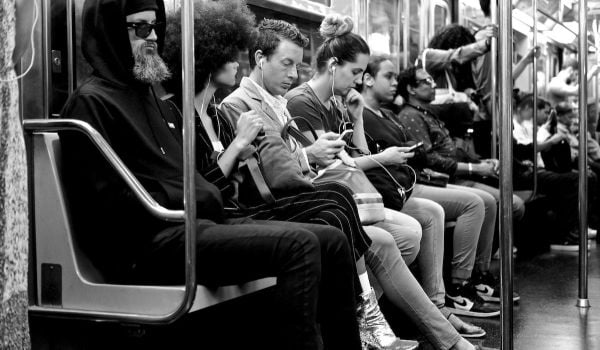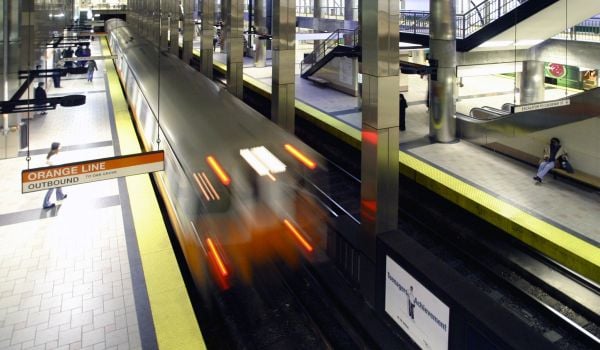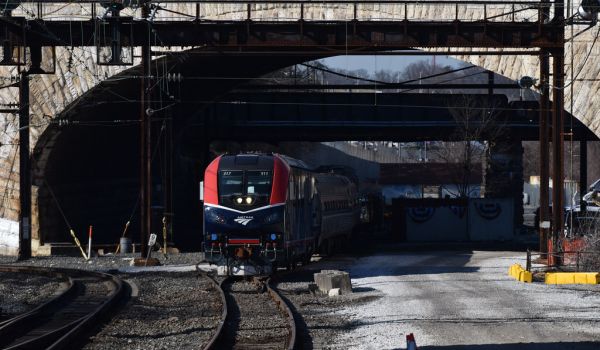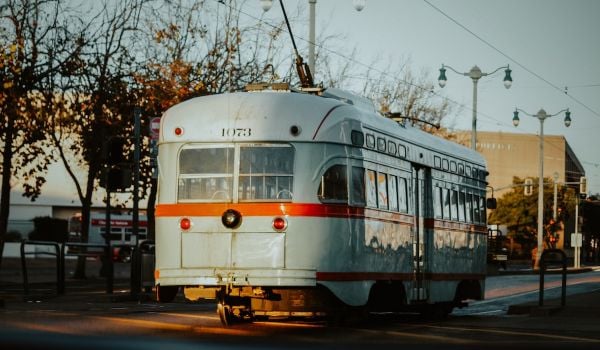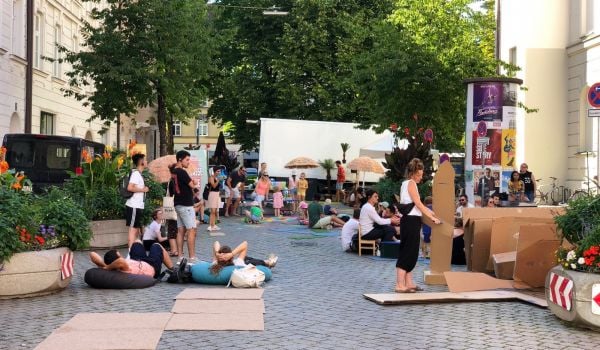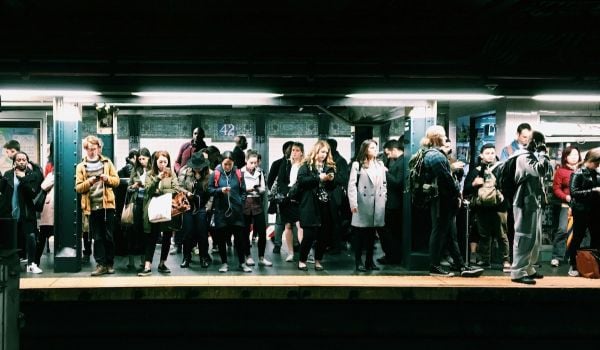Rachel Reilly Carroll was in Albuquerque when it clicked. She was at the Sundowner, today an affordable housing complex, formerly a motel where Bill Gates and Paul Allen stayed while developing Microsoft. A row of kids’ painted self-portraits hung on the wall. In that moment, she clearly saw a simple summation of the main frustration she’d been hearing from affordable housing residents and struggling renters from Pittsburgh to Kansas City. As their neighborhoods receive new investment, as new transit lines price them out of their homes, as new residents clamor in, long-term residents aren’t being seen, she thought.
Reilly Carroll, an associate director of impact investing at Enterprise Community Partners, says, “I’ve never been able to name that dynamic until this trip.”
She had the realization while one of 26 participants on a cross-country trip organized by the Millennial Trains Project (MTP). The nonprofit takes select groups of young entrepreneurs, activists, artists and innovators from city to city to help them grow as leaders and expand their visions beyond the regional. Hers was the fourth annual journey, but this summer marked the first time the nonprofit ran two trips: one heading west, and then another returning east.
For one week on the westward trip, Reilly Carroll and 25 others traveled by Amtrak from Pittsburgh to Chicago to Kansas City to Albuquerque to Los Angeles, meeting with local officials and residents on the way. They traveled, ate and slept in vintage rail cars outfitted with 3D printers, computers and scanners. On-train mentors gave lectures, held office hours and facilitated discussions. In the cities where they stopped, they often had the opportunity to converse with mayors. And every participant came aboard with a project, some idea they’ve been working on that could benefit from a national perspective.
“A lot of people who do Millennial Trains Project, they’ve been making great strides within their community in the cities or rural communities where they live,” says founder and CEO Patrick Dowd. “Millennial Trains Project is often their first experience taking their ideas that they’ve built up locally to other regions, and imagining what they might look like on a broader geographical scope.”
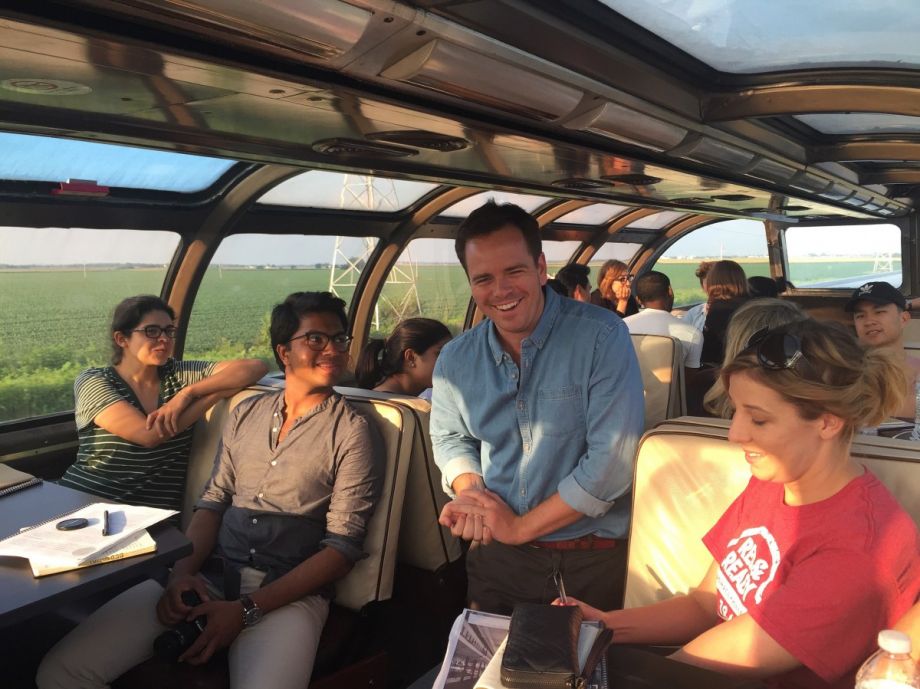
Patrick Dowd with MTP participants (Credit: Millennial Trains Project)
Millennials apply for a spot on the train, and if accepted, most crowdfund to cover the costs. Participation fees are about $5,000, and Dowd says he can count on one hand the number of people who have funded it themselves. Most turn to their social networks, and about a fifth receive scholarship funding from one of the nonprofit’s partners, which include the Rockefeller Foundation, Comcast NBCUniversal, the U.S. State Department, and TransitCenter, a transit advocacy group.
Reilly Carroll’s trip was partially sponsored by TransitCenter and by Make Room, an advocacy campaign to raise awareness about the rental housing crisis and a partner organization of Enterprise Community Partners. For her onboard project, Reilly Carroll focused on the intersection of two issues: the impact of urban transit on affordable rental housing
She talked to public housing residents in need of better transit access, and to low-income renters who use transit daily but are concerned about being displaced by rising rents. She asked what transit permitted in their lives that would be impossible without it. “Public transit for these residents, it’s their lifeline,” she says. And as development clusters around newly attractive transit corridors, low-income residents’ access to transit is being threatened. “What struck me was the degree to which this issue was affecting everyone,” says Reilly Carroll. “In every city it resonated.”
The connection was especially clear in Albuquerque, where after years of contentious debate, a new bus rapid transit line on a main thoroughfare received approval and funding in March. (Some residents continued to fight the project.) Between the first of that month and July 20, the value of building permits within the area five-eighths of a mile from the corridor increased by 12 percent.
When Reilly Carroll heard that, she was concerned that the risk of displacement would increase, both for renters and for homeowners who would see their property taxes rise. Thanks to MTP, she was able to speak with the city’s mayor and his economic development coordinator about it. She shared the example of Kansas City, which received technical assistance and funding from Smart Growth America and the National Resources Network to aim for equitable development along a new streetcar line. Now that she’s back in D.C., Reilly Carroll has been working to put Albuquerque in touch.
Dowd says the interest and involvement of mayors has been one of the most beneficial aspects of the project. They’re not just lecturing participants, he says, but having dialogues in which local leaders are listening to and learning from millennials’ insights. Dowd sees MTP’s benefit occurring on three levels: on a personal level for participants, on a community level for the cities they visit and on a national, collective level.
“On a participant basis, it’s the opportunity to have your assumptions and prejudices challenged by the way people do things in other regions of our country,” he says. “We don’t really have a mechanism, popular mechanism for exposing people to the different regions of our country in the same way that it’s taken as an article of faith that it would be worthwhile for a young person to travel abroad at some point.”
Dowd hopes MTP gives the passengers support to take risks, even as it broadens the scope of their projects. One past participant learned about different models for managing homeless services across the country, and then used her insights to open a new youth drop-in center in her native Detroit. Another participant launching a business that uses surplus lawn space to grow food met with urban farmers and community gardeners to gauge their interest. Reilly Carroll says, beyond connecting Albuquerque with resources for equitable development, she’s still trying to figure out how to integrate what she’s learned into her work.
“Every single city is struggling with this in a different way,” she says, but her trip also helped her see the commonalities, see the country, see the problem. Later she wrote me, “We cannot legislate our way out of gentrifying neighborhoods. … There needs to be a social awareness of what we are doing to these communities and the people that have lived there for decades when we are not responsible and thoughtful about how we seek to ‘reinvest’. We need to see them.”
Jen Kinney is a freelance writer and documentary photographer. Her work has also appeared in Philadelphia Magazine, High Country News online, and the Anchorage Press. She is currently a student of radio production at the Salt Institute of Documentary Studies. See her work at jakinney.com.
Follow Jen .(JavaScript must be enabled to view this email address)

